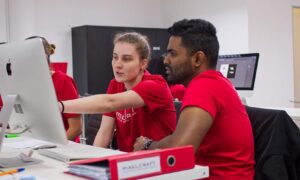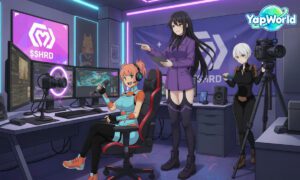Are you ready to take a quantum leap into the future? As technology continues to evolve, we find ourselves on the brink of a monumental shift from the real world to the metaverse. But what does this mean for us, and how can we ensure a seamless transition? In this blog post, we will unravel the secrets behind unlocking your potential in this digital realm by highlighting the top skills you need to thrive in the metaverse.
Introduction
The concept of a “metaverse” may sound like something out of a science fiction novel, but it is quickly becoming a reality. In simple terms, the metaverse refers to an immersive virtual world where users can interact with each other in real-time through avatars. It is essentially an online space that combines elements from multiple digital platforms, such as virtual and augmented reality, social media, gaming, and e-commerce.
While the idea of a metaverse has been around for decades, recent advancements in technology have brought it closer to reality. With the rise of 5G networks, artificial intelligence, and virtual reality devices such as the Oculus Rift and HTC Vive, the infrastructure for creating a fully functioning metaverse is now within reach.
Understanding the Different Skills Needed for the Metaverse
As society continues to progress towards a more digital and interconnected world, the concept of the metaverse has become increasingly relevant. The metaverse refers to a virtual shared space where people can interact with each other in real time through avatars and engage in activities that mimic the real world. With major companies investing in this technology, it is clear that the metaverse will play a significant role in our future.
But what does this mean for individuals? As we transition from the physical world to the metaverse, it is essential to understand the different skills needed to thrive in this new environment. In this section, we will explore some of these crucial skills and how they translate into success within the metaverse.
1. Digital Literacy:
The first skill needed in the metaverse is digital literacy. This includes having basic knowledge of computer systems, software programs, and online communication tools. In the metaverse, everything operates through digital platforms, so being comfortable with technology is crucial for navigation and interaction.
Additionally, individuals need to be aware of online etiquette, as interactions within the metaverse are similar to those on social media platforms. This involves understanding concepts such as online privacy and appropriate behavior when engaging with others virtually.
2. Virtual Collaboration:
In today’s interconnected world, collaboration is key to success. Similarly, in the metaverse, teamwork plays an important role, as activities are often conducted collectively by groups of avatars. Therefore, individuals must possess excellent virtual collaboration skills, such as effective communication techniques like active listening and clear expression.
Moreover, individuals must also be able to work well with others from diverse backgrounds and cultures, as the metaverse is a global community.
Technical Skills: Coding, Virtual Reality Design, and Artificial Intelligence
In order to thrive in the metaverse, it is essential to have strong technical skills that can help you navigate and create within this immersive digital world. Three key technical skills that are particularly valuable in the metaverse include coding, virtual reality design, and artificial intelligence.
Coding is the foundation of the metaverse, as it enables you to build and customize your own virtual experiences. Whether you want to create a game, social platform, or interactive environment, having a strong understanding of coding languages such as C++, JavaScript, and Python will be crucial. These languages are used to program everything from graphics and physics engines to user interfaces and interactions within the metaverse.
Virtual reality (VR) design is another critical skill for those looking to enter the metaverse. VR allows users to fully immerse themselves in a digital environment through the use of specialized headsets or other devices. As more and more people begin to explore virtual spaces in the metaverse, there will be a growing demand for skilled VR designers who can create engaging and realistic experiences. Understanding 3D modeling software like Maya or Blender will also be beneficial for creating detailed virtual environments.
Artificial intelligence (AI) is revolutionizing many industries, including gaming and virtual reality. In the context of the metaverse, AI can enhance user experiences by creating dynamic environments that respond intelligently to user actions. For example, AI could be used in games within the metaverse to provide non-player characters with realistic behaviors and reactions. Having knowledge of AI programming languages like Python and R, as well as machine learning techniques, will give you a competitive edge in the metaverse job market.
Creative Skills: Graphic Design, Animation, and Storytelling
In today’s digital age, having creative skills is essential for anyone looking to make a successful transition from the real world to the metaverse. These skills not only allow individuals to express their creativity but also provide them with a competitive edge in the constantly evolving virtual landscape. In this section, we will discuss the top creative skills that are in high demand in the metaverse: graphic design, animation, and storytelling.
Graphic Design:
Graphic design is the art of visual communication through various mediums such as typography, images, colors, and layout. In the metaverse, graphic design plays a crucial role in creating immersive and visually appealing environments. From designing logos and user interfaces to creating 3D models and assets for virtual worlds, graphic designers are in high demand.
To excel in graphic design for the metaverse, one must have a strong understanding of color theory, composition techniques, and digital tools like Adobe Photoshop or Illustrator. Additionally, having knowledge of 3D modeling software such as Blender or Maya can be beneficial, as many virtual worlds require custom-made assets.
Animation:
Animation is another integral part of the metaverse experience. It brings life to characters and objects within virtual environments through movement. From simple 2D animations to complex 3D animations using motion capture technology, there is a wide range of animation techniques used in the metaverse.
Having knowledge of animation principles such as timing and spacing, squash, and stretching can help create realistic movements in the virtual world. Additionally, proficiency in animation software like Adobe Animate or Autodesk Maya is essential for creating high-quality animations.
Storytelling:
The metaverse is not just about flashy graphics and cool animations. It’s also about creating meaningful and engaging experiences for users. This is where storytelling comes into play. Through narrative, characters, and world-building, storytellers can transport users to a whole new world in the metaverse.
To be a successful storyteller in the metaverse, one must have a strong understanding of storytelling techniques such as plot development, character building, and dialogue writing. Familiarity with interactive storytelling tools like Twine or Ink can also be beneficial for creating immersive experiences for users.
Social Skills: Community Management, Networking, and Communication
Social skills are essential for success in both the real world and the metaverse. In today’s interconnected society, being able to effectively manage communities, build networks, and communicate with others is crucial for thriving in any environment. However, as we shift towards a more digital existence with the rise of virtual worlds and online platforms, these skills take on even greater importance.
Community management is the process of building and maintaining relationships within a group or community. In the metaverse, this could include managing a virtual community on a gaming platform or social media network. Community managers are responsible for fostering engagement, resolving conflicts, promoting positive interactions, and creating a sense of belonging for members.
To be an effective community manager in the metaverse, one must possess strong interpersonal skills such as empathy, active listening, adaptability, and conflict resolution. They also need to have a deep understanding of online behavior and be able to navigate virtual spaces with ease. Building an inviting and inclusive community can greatly enhance your experience in the metaverse by providing support, opportunities for collaboration, and growth.
Networking is another critical skill needed to succeed in both the real world and the metaverse. It involves cultivating relationships with individuals or groups who can provide valuable opportunities or resources. In traditional settings like conferences or networking events, this may involve exchanging business cards or engaging in small talk to establish connections. In the metaverse context, it could mean joining online communities related to your interests or profession.
Networking in the metaverse requires similar skills as traditional networking but also requires an understanding of virtual platforms and the ability to navigate them effectively. It’s important to be genuine and authentic in your interactions and to offer value to others rather than just seeking opportunities for yourself. By building a strong network in the metaverse, you can create new connections, find mentors, and even open up career opportunities.
Finally, effective communication is crucial for social success in any environment. In the metaverse, communication takes on a different form than traditional face-to-face interactions. This could include using emojis, text chat, voice chat, or virtual gestures to convey messages and emotions. It’s important to be aware of these differences and adjust your communication style accordingly.
Practical Skills: Project Management, Problem Solving, and Adaptability
The transition from the real world to the metaverse requires a diverse set of skills that go beyond technical proficiency. As we navigate this new virtual landscape, it is crucial to possess practical skills such as project management, problem-solving, and adaptability. These abilities are essential for success in any environment, but they become even more critical when entering a completely new realm.
Project Management:
In the metaverse, projects can range from building virtual worlds to organizing events and creating immersive experiences. Having strong project management skills will ensure that these projects are executed efficiently and effectively. This includes setting clear goals, allocating resources wisely, and managing timelines.
One key aspect of project management in the metaverse is collaboration. As multiple individuals or teams work on different aspects of a project simultaneously, effective communication and coordination become crucial. It is essential to establish clear roles and responsibilities and maintain open lines of communication to keep everyone on track towards achieving the common goal.
Problem Solving:
With constant technological advancements in the metaverse, unexpected challenges are bound to arise. That’s where problem-solving skills come into play. Being able to identify issues quickly and find creative solutions is vital in this rapidly evolving environment.
One important aspect of problem-solving in the metaverse is understanding how various technologies work together. A background in coding or design can be beneficial here, as it enables you to troubleshoot potential issues more efficiently. However, even if you don’t have prior technical knowledge, having a curious mindset and being resourceful can still help you overcome obstacles in the metaverse.
Adaptability:
The metaverse is a rapidly evolving space, and what may be true today may not be valid tomorrow. As such, being adaptable is crucial for success. This includes constantly learning new skills, keeping up with emerging technologies, and being open to change.
Being adaptable also means being comfortable with uncertainty. In the metaverse, things may not always go as planned, and new challenges and opportunities may arise unexpectedly. Being able to pivot quickly and adjust your plans is essential for success in this environment.
Conclusion
As we continue to explore the potential of the metaverse, it’s clear that practical skills will play a significant role in our success. Project management, problem-solving, and adaptability are just a few examples of the skills needed to thrive in this virtual landscape. By developing these abilities, we can effectively navigate the metaverse and unlock its full potential.



































